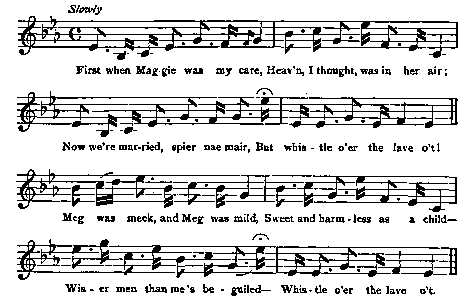Дальше, чур ни слова! (Бернс/Смирнов)
| Дальше, чур ни слова! , пер. Д. Смирнов-Садовский (р. 1948) |
| Язык оригинала: шотландский. Название в оригинале: Whistle O'er The Lave O't. — Опубл.: 1789 (перевод). Источник: http://www.robertburns.org/works/273.shtml |
1789.
Перевод: 15 октября 2009, Сент-Олбанс. |
1789
|
Примечания
Песня датируется 1789 годом. Напечатана в «Шотладском Музыкальном Музеуме» в 1790 г. Название заимствовано из песни 17 века “Whistle o'er the lave o't” (которое по смыслу можно было бы перевести «До остального мне дела нет»). На этот же мотив написана песня скрипача из кантаты «Весёлые нищие» или «Развесёлые нищеброды» (где рефрен е переводится С. Маршаком «Плевать на остальное!», а С. Петровым «...будь оно, что будет!»)
Стихотворение и комическое, и драматическое одновременно, где говорится о надежде на счастье до женитьбы и серьёзном разочаровании после – до такой степени, что его герой прозрачно намекает, что желал бы своей жене Мэгги стать пищей для червей, и что он так прямо бы и написал, да она прочтёт!.. То, что Бернс сочинил такое через год после женитьбы (на Джин Армор), может навести на некоторые размышления...
Мелодия:
Изображение
Whistle O'er The Lave O't
1789
Приложение I
http://wikilivres.ca/wiki/Songs_of_Robert_Burns/First_when_Maggie_was_my_care
Page 421. I'll. LOVE-SONGS : HUMOROUS
IV. CONNUBIAL
No. 209. First when Maggie was my care. Scots Musical Museum, 1790, No. 249, signed X., entitled Whistle o'er the lave o't. ' Mr. Bnrns's old words' (Law's MS. List). Burns got the title of this from a song of the seventeenth century. The lords of creation in Scotland were no better than their sex elsewhere. They were never so good as to be able to dispense with the discipline of married life. It has not been ascertained to whom Burns referred in this song. In Herd's Scots Songs, 1769, 316, are the two following stanzas for the tune :—
' My mifher sent me to the well, [' My mither sent me to the sea, |
This is styled one of the malignant songs in Scotch Presbyterian Eloquence of the seventeenth century. The tune Whistle ower the lave o't is in Bremner's Reels, 1759, j6. It varies a little from the copy in the Museum. It is also in the Caledonian Pocket Companion, 1759, xii. jj. C. Kirkpatrick Sharpe incorrectly stated that Dance Katie ________________________________________ Page 422. HISTORICAL NOTES
Bairdie of the seventeenth century is the same tune. He retails a traditional story of a pedestrian who, crossing Glasgow churchyard one moonshine night, saw the Devil and a male acquaintance who had recently died dancing round the tombstone of the dead man, his majesty playing on the fiddle Whistle o'er the lave o't. Another proof, if any were wanted, that the devil knows and appreciates good music. The tune is said to be in Blaiiie's MS., 1692, which is not improbable. According to Burns, John Bruce, a Highland fiddler who lived in Dumfries, composed the air about the beginning of the eighteenth century. (See Letter to Thomson, Oct. 1794.)
Приложение II
http://www.aestheticrealism.org/tro1717.html
A Poem, Comic & Musical, about Marriage
There is a comic and musical poem of Robert Burns about disappointment in marriage. It's called “Whistle o'er the Lave o 't ,” which is Scottish for “Whistle over the Rest of It.” The speaker in the poem says that when he was courting Maggie, or Meg, she seemed wonderfully sweet. But now she's so awful, he wishes she were dead. Here's the first stanza (“spier nae mair” means “ask no more”):
First when Maggie was my care, |
It happens that Burns has some of the most sincere poems in praise of women—Jean, Mary Morison, Nancy, and more. And he has also poems describing wives as shrews, to be gotten away from in Scottish taverns. There's the wife mentioned early in “Tam O'Shanter”: “our sulky, sullen dame, / Gathering her brows like gathering storm, / Nursing her wrath to keep it warm.” He is authentically poetic about both kinds of ladies.
But what's the relation between them? What happened to the couple in “Whistle o'er the Lave o 't ”? The man says he'd been “beguil'd,” fooled into thinking Meg was sweet, and the poem ends with this statement about her (“Wha” is “who”):
Wha I wish were maggots' meat, |
The charm of this has to do with the way breeziness and the terrible, casualness and distress, are liltingly together: he wishes she were food for maggots, but he'll whistle.
|
© D. Smirnov-Sadovsky. Translation. Can be reproduced if non commercial. / © Д. Смирнов-Садовский. Перевод. Комментарий
| Это произведение опубликовано на Wikilivres.ru под лицензией Creative Commons |

